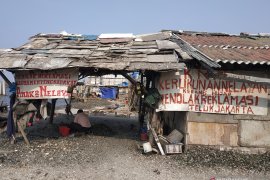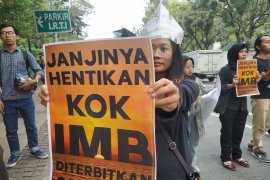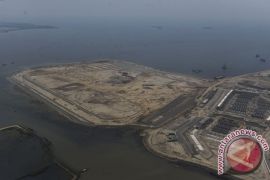Nine developers, including major private real estate and state-owned companies, had received permits to build a total of 17 islands in Jakarta Bay, with an estimated investment of Rp150 trillion, or US$11.4 billion.
Jakarta Governor Basuki Tjahaja Purnama (Ahok) has frequently cited Dubai and Singapore as successful examples of reclamation work, stating that the Jakarta Bay reclamation would make the city as advanced as them. Super blocks are planned to be built on the new islands.
The reclamation of the northern coast of Jakarta is expected to transform the area into a hub for economic growth.
The Jakarta Bay reclamation project has become controversial after a bribery case concerning the mega project came to light, and demonstrations against the project were staged by the affected fishermen and the urban poor.
The Indonesian Traditional Fishermen Association (KNTI) pointed out that the project had reduced the income of the local fishermen by some 40 to 50 percent.
"Obviously, it has had a huge impact on the economy of traditional fishermen as their income has dropped by 40 to 50 percent," KNTI chief patron Chalid Muhammad remarked recently.
The reclamation project has affected some three thousand fishermen and has resulted in the eviction of 3,579 families during the 2000-2011 period.
Last April, the Jakarta authorities had given instructions to relocate some 1.7 thousand families comprising over 4.9 thousand residents of the Luar Batang area, northern Jakarta. The forced eviction has been resisted by some of the residents, mostly traditional fishermen.
The project is believed to be more business-oriented than in tune with the publics interests.
Coordinating Minister for Maritime Affairs Rizal Ramli recently visited the C, D, and G islands to get firsthand information regarding the Jakarta Bay reclamation project.
After inspecting the project, the minister called for a study on the usage of reclamation projects to prevent them from becoming barriers that divide the poor from the rich.
"A review should be conducted on the use of the reclaimed land. I do not want the presence of any physical and non-physical fortresses in Indonesia, meaning that only the rich could live, while the poor are evicted to some other location," Ramli stated.
He cited the example of certain Latin American countries where members of the high-class society were scared of underprivileged people.
"Their homes are surrounded by fortresses. Wherever they go, they use bulletproof vehicles as they are scared of the poor people," he noted.
"We do not want any barriers to be created between the rich and poor," he pointed out.
He emphasized that reclamation projects must prioritize three interests.
First is the interest of the state that is keen to ensure minimal impact on the environment.
Second is the interest of the public, including the fishermen, while the third concerns business and commercial interests.
"As the president has said, it is not good if reclamation is controlled by the private sector. The state must decide the regulations and laws, and the developers must follow them. If not, what would the country become if (we) are dictated by private companies? Our task is to ensure that those three interests are optimally served and protected," the coordinating minister affirmed.
The field visit also revealed that several regulations were violated during the implementation of a part of the project, according to Imam Prasodjo, sociologist of the University of Indonesia, who accompanied Minister Rizal Ramli during the inspection.
"One developer has denied permission to conduct supervision. The minister firmly stated that the onus to abide by the governments regulations lies with the developers," the sociologist noted in a statement in early May.
However, developers resisting any form of supervision would be given a weeks deadline after which the government will send a joint team, backed by military officers, including the marines, to supervise the project, Prasodjo stated.
The sociologist believes that the Jakarta administration had not been careful in managing the reclamation project; hence, President Joko Widodo had ordered a complete audit.
The lecturer also refuted a statement made by Jakarta Governor Ahok that there were no more fishermen in Jakarta.
Ahoks statement is incorrect as some 28 thousand traditional fishermen still reside in Jakarta, according to Prasodjo.
The governor was wrong again when he claimed that there are no fish in Jakartas waters, he noted, adding that fish were still there, but some of them had moved further away due to the reclamation project, he remarked.
"Furthermore, at the Muara Angke fish auction market, it was revealed that during the era of President Soeharto, a fishermans village had been set up as a pilot project in Asia. However, it is also going to be demolished. It demonstrates inconsistency in implementing policies as forced evictions have occurred several times," he pointed out.
He, however, urged everyone to view the problems in Jakarta with a clear mind and emphasized that violators must be sanctioned regardless of race, religion, and ethnicity.
Walhi Jakarta Executive Director Puput T.D. Putra noted in a statement recently that reclamation is not in the interest of the Jakarta public but would only benefit a group of elites and capitalists at the expense of nature and traditional fishermen.(*)
Reporter: Fardah
Editor: Heru Purwanto
Copyright © ANTARA 2016




